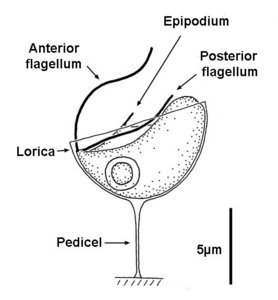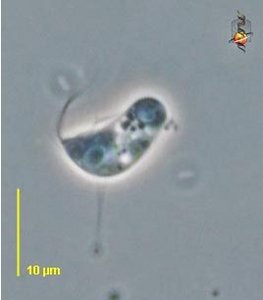Reclinomonas
Reclinomonas americana
Alastair SimpsonIntroduction
Reclinomonas is a genus of loricate Jakobids (Jakobida; Histionidae). There is one described species, Reclinomonas americana Flavin and Nerad 1993. Reclinomonas is known primarily because Reclinomonas americana was the first jakobid for which mitochondrial genome sequence data were published.
Characteristics

Figure 1. Reclinomonas americana. Diagram showing general appearance of live trophic cell under light microscopy. Temporary food vacuoles and the contractile vacuole not shown. © Alastair Simpson
Reclinomonas cells are small (5-12 μm—O'Kelly, 1997) with two flagella, and a conspicuous groove, which is usually considered to mark the 'ventral side' of the cell in jakobids. The cell normally resides within a delicate wine-glass-shaped organic lorica—the stem of the glass (the pedicel) attaches to the substrate, and thus the organism is sessile. The cell 'reclines' in the lorica with the ventral (grooved) side uppermost (as in the title illustration). The lorica is adorned with very fine nail-shaped scales that can only be seen by electron microscopy (Flavin and Nerad, 1993). About 1/3 of the way down the cell the left margin of the groove is drawn out into a short, fine microtubule-supported extension - the epipodium (Flavin and Nerad, 1993; O'Kelly, 1997) that can be mistaken for a short flagellum (Figure 1).
Reclinomonas reproduces by binary fission, after which one cell usually inherits the parental lorica. while the other swims away as a zoospore that is smaller than most trophic cells, but has longer flagella (O'Kelly, 1997). The zoospore presumably settles and produces a new lorica. The zoospore includes a vesicle containing the nail-shaped scales that will be attached to the newly-made lorica (Flavin and Nerad, 1993; O'Kelly, 1997). Reclinomonas americana also forms cysts - these are usually found still within the lorica, and are rounded with a small button-like protusion (O'Kelly, 1997).
Reclinomonas has only been reported from freshwater. Reported cultures of Reclinomonas americana were made from isolates from North America and New Zealand (Flavin and Nerad, 1993; O'Kelly, 1997). Cells are normally seen with a posterior contractile vacuole (not shown in Figure 1).
The mitochondrial genome of Reclinomonas americana ATCC 50394 was the first jakobid mitochondrial genome to be published (Lang et al. 1997). This genome contained many more functional genes than any mitochondrial genome studied before, including four genes for a eubacterial-type RNA polymerase. In the last decade mitochondrial genome sequences have been determined for several other jakobids, and most of the unusual features seen in Reclinomonas turn out to be typical for jakobids as a whole (Gray et al., 2004). The mitochondrial genomes of jakobids are discussed in more detail on the Jakobida page.
Taxonomic note
Reclinomonas is treated here as a monotypic genus. Flavin and Nerad (1993) proposed moving Histiona campanula Penard 1921 to Reclinomonas, but this has not been followed here since Histiona campanula is more similar morphologically to the type species of Histiona, Histiona velifera, as observed in detail by Petersen and Hansen (1961), than it is to Reclinomonas americana. Modern microscopical and molecular data from Histiona campanula are needed.
References
Flavin, M. & Nerad, T. A. (1993) Reclinomonas americana n. g., n. sp., a new freshwater heterotrophic flagellate. J. Eukaryot. Microbiol. 40: 172-179.
Gray, M. W., Lang, B. F. & Burger, G. (2004) Mitochondria of protists. Annu. Rev. Genet. 38: 477-525.
Lang, B. F., Burger, G., OíKelly, C. J., Cedergren, R., Golding, G. B., Lemieux, C., Sankoff, D., Turmel, M. & Gray, M. W. (1997) An ancestral mitochondrial DNA resembling a eubacterial genome in miniature. Nature 387: 493-497.
OíKelly, C. J. (1993) The jakobid flagellates: structural features of Jakoba, Reclinomonas and Histiona and implications for the early diversification of eukaryotes. J. Eukaryot. Microbiol. 40: 627--636.
OíKelly, C.J. (1997) Ultrastructure of trophozoites, zoospores and cysts of Reclinomonas americana Flavin & Nerad, 1993 (Protista incertae sedis: Histionidae). Europ. J. Protistol. 33: 337-348.
Patterson, D.J., VÝrs, N., Simpson, A.G.B. & O'Kelly, C.J. (2002) Residual and predatory heterotrophic flagellates. In: Lee, J.J., Leedale, G.F.& Bradbury P. (ed.) An illustrated guide to the protozoa, second edition. pp 1302-1328. Society of Protozoologists, Lawrence, Kansas.
Penard, E. (1921) Studies on some flagellata. Proceedings of the Academy of Natural Sciences of Philadelphia. 73: 105-168
Petersen, J.B. and Hansen, J.B. (1962) One some neuston organisms III. Svensk. Botanisk. Tidskrift 57: 293-305.
Title Illustrations

| Scientific Name | Reclinomonas americana |
|---|---|
| Source | Reclinomonas |
| Source Collection | Micro*scope |
| Image Use |
 This media file is licensed under the Creative Commons Attribution-ShareAlike License - Version 2.5. This media file is licensed under the Creative Commons Attribution-ShareAlike License - Version 2.5.
|
| Copyright | © |
About This Page
This page is being developed as part of the Tree of Life Web Project Protist Diversity Workshop, co-sponsored by the Canadian Institute for Advanced Research (CIFAR) program in Integrated Microbial Biodiversity and the Tula Foundation.
Alastair Simpson

Dalhousie University, Halifax, Nova Scotia, Canada
Correspondence regarding this page should be directed to Alastair Simpson at
Page copyright © 2008 Alastair Simpson
 Page: Tree of Life
Reclinomonas . Reclinomonas americana .
Authored by
Alastair Simpson.
The TEXT of this page is licensed under the
Creative Commons Attribution-NonCommercial License - Version 3.0. Note that images and other media
featured on this page are each governed by their own license, and they may or may not be available
for reuse. Click on an image or a media link to access the media data window, which provides the
relevant licensing information. For the general terms and conditions of ToL material reuse and
redistribution, please see the Tree of Life Copyright
Policies.
Page: Tree of Life
Reclinomonas . Reclinomonas americana .
Authored by
Alastair Simpson.
The TEXT of this page is licensed under the
Creative Commons Attribution-NonCommercial License - Version 3.0. Note that images and other media
featured on this page are each governed by their own license, and they may or may not be available
for reuse. Click on an image or a media link to access the media data window, which provides the
relevant licensing information. For the general terms and conditions of ToL material reuse and
redistribution, please see the Tree of Life Copyright
Policies.
- First online 05 September 2008
- Content changed 05 September 2008
Citing this page:
Simpson, Alastair. 2008. Reclinomonas . Reclinomonas americana . Version 05 September 2008. http://tolweb.org/Reclinomonas_americana/97410/2008.09.05 in The Tree of Life Web Project, http://tolweb.org/









 Go to quick links
Go to quick search
Go to navigation for this section of the ToL site
Go to detailed links for the ToL site
Go to quick links
Go to quick search
Go to navigation for this section of the ToL site
Go to detailed links for the ToL site